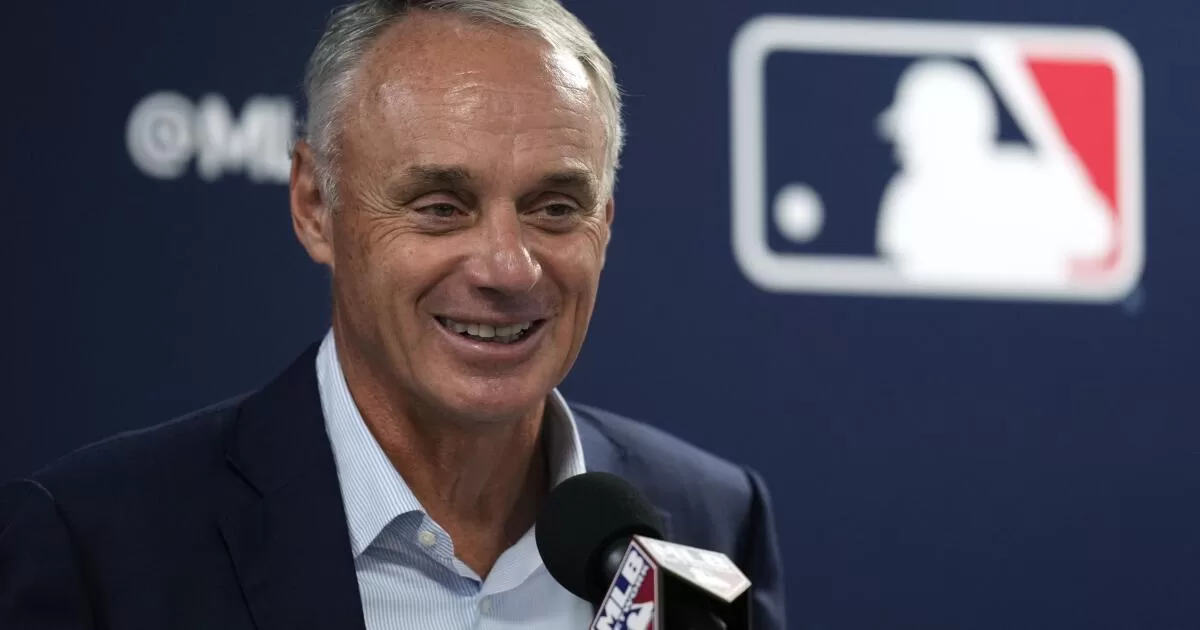This is not a conspiracy, just the cold reality of a sport that has engineered a postseason format in which promoting hope, faith and interest across the land is the priority, not crowning the best team as champion.
The Dodgers spent more than $1 billion over the winter to assemble the best team Guggenheim’s money could buy. For every five season simulations Baseball Prospectus ran, the Dodgers failed to win the World Series four times. For every six simulations Fangraphs ran, the Dodgers failed to win the World Series five times.
If you are a Dodgers fan, this might not be what you want to hear. The Arizona Diamondbacks finished 16 games behind the Dodgers last season, then eliminated them from the playoffs. The San Diego Padres finished 22 games behind the Dodgers in 2022, then eliminated them from the playoffs.
As they say: It’s not a bug, it’s a feature.
The official name of the luxury tax is the competitive balance tax, but it has become less about competitive balance and more about providing owners a mechanism to restrain spending because they have been unable to persuade players to accept a salary cap.
The Dodgers’ ownership does not wish to be restrained. The Angels’ ownership does. The Padres’ ownership did not, under the late Peter Seidler, but now it does.
So, with the competitive balance tax not resulting in significant competitive balance, the solution so far has been to expand the playoffs. Since 1998, when MLB expanded to 30 teams, the league has expanded the playoffs from eight to 10 to 12 teams — and, remember, the owners proposed a 14-team playoff field in the last collective bargaining negotiations.
“Not every competitive balance undertaking is solely related to direct expenditures on players,” commissioner Rob Manfred told me earlier this spring. “I do see the expanded playoffs as creating additional competitive opportunities.
“One of the reasons I don’t fret so much about the fact that a 110-win team gets knocked out: If you’re going to have bigger playoffs, you want there to be enough randomness in the results that making the playoffs means something, even if you’re not the No. 1 team.”
Since Manfred became commissioner in 2015, one team has won 110 games: The 2022 Dodgers, with 111 victories.
In the previous 10 years, the team with the best record has won the World Series three times, the 2020 Dodgers among them. In those 10 years, a wild-card team has won three times.
The Diamondbacks might never spend $300 million on a season’s payroll, and so they might never sign up all the depth needed to beat the Dodgers over 162 games, but now they have a chance to win the World Series just by getting into the playoffs.
Is that basically the game plan?
“Exactly,” Manfred said. “That’s exactly right.”
The 84-win Diamondbacks got into the World Series last year. Just get into the playoffs, whether your team wins 84 games or 111, and from there, you’re just as good, right?
“I don’t know that you’re just as good,” Arizona general manager Mike Hazen told me. “In baseball, given the way it is structured, you have just as good a chance, if you have two really good starting pitchers, to make the series competitive, and then who knows what happens on a given day?
“I think that cost us in the World Series. We ran out of starting pitchers. We only had three. They got to us in Game 4 of the World Series (Arizona gave up 11 runs in a bullpen game), and we were on our heels at that point.”
The NFL runs a 14-team playoff, but Patrick Mahomes has won three times in the last five years. Tom Brady won seven times in 20 years.
The NBA runs a 16-team playoff (not including play-in games), but when LeBron James decided he wanted to join Dwyane Wade and Chris Bosh in Miami, the Heat won two NBA titles in the next three years.
“Baseball is an interesting sport, especially in the playoff environment,” Hazen said. “A lot of what dictates how you’re going to do on a given day is your starting pitcher, right?
“In other sports, that is not the case. Your five guys go out there to play, and the better teams are going to end up winning.”
The Colorado Rockies have been in business 32 years. They’ve never won a division title. They appeared in the World Series in 2007, when they brought “Rocktober” to Denver as a wild-card team.
“Once you get into the playoffs, it’s the old adage: anything can happen,” Rockies manager Bud Black said.
“In football, the two best teams in my opinion got in [to the last Super Bowl]: the 49ers and the Chiefs. But, in baseball, that hasn’t seemed to be the case the last number of years. And I think, for all the teams that don’t have the super high payroll, there is hope.”
The Rockies, like the Diamondbacks, are not about to run a $300-million payroll. The Rockies, like the Diamondbacks, are unlikely to dethrone the Dodgers in the NL West.
“Payroll helps you up front, and with depth,” Black said. “It helps you acquire the high-end talent. But where it really helps you is to supplement the roster.”
As an example, Black cited what he called “the Daniel Hudson model, the Blake Treinen model,” in which the Dodgers pay an injured player to rehabilitate with them one year in the hope he can play for them the next year.
“A lot of teams can’t afford to do that,” Black said.
But if all your team needs is 80-some wins to get into the playoffs, it’s that adage again.
“If you have a good team and get into the playoffs,” Black said, “and you have a pitching staff that is rolling and a couple guys swinging the bats, anything can happen.”
That is exactly what MLB relishes, and exactly what the Dodgers must fear.
